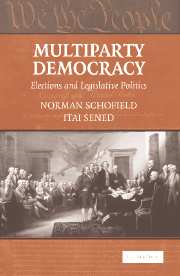Book contents
- Frontmatter
- Contents
- List of Tables and Figures
- Preface
- 1 Multiparty Democracy
- 2 Elections and Democracy
- 3 A Theory of Political Competition
- 4 Elections in Israel, 1988–1996
- 5 Elections in Italy, 1992–1996
- 6 Elections in the Netherlands, 1979–1981
- 7 Elections in Britain, 1979–2005
- 8 Political Realignments in the United States
- 9 Concluding Remarks
- References
- Index
- POLITICAL ECONOMY OF INSTITUTIONS AND DECISIONS
1 - Multiparty Democracy
Published online by Cambridge University Press: 06 July 2010
- Frontmatter
- Contents
- List of Tables and Figures
- Preface
- 1 Multiparty Democracy
- 2 Elections and Democracy
- 3 A Theory of Political Competition
- 4 Elections in Israel, 1988–1996
- 5 Elections in Italy, 1992–1996
- 6 Elections in the Netherlands, 1979–1981
- 7 Elections in Britain, 1979–2005
- 8 Political Realignments in the United States
- 9 Concluding Remarks
- References
- Index
- POLITICAL ECONOMY OF INSTITUTIONS AND DECISIONS
Summary
INTRODUCTION
When Parliament first appeared as an innovative political institution, it was to solve a simple bargaining problem: Rich constituents would bargain with the King to determine how much they wished to pay for services granted them by the King, such as fighting wars and providing some assurances for the safety of their travel and property rights.
In the modern polity, governments have greatly expanded their size and the range and sphere of their services, while constituents have come to pay more taxes to cover the ever-growing price tag of these services. Consequently, parliamentary systems and parliamentary political processes have become more complex, involving more constituents and making policy recommendations and decisions that reach far beyond decisions of war and peace and basic property rights. But the center of the entire bargaining process in democratic parliamentary systems is still Parliament.
Globalization trends in politics and economics do not bypass, but pass through local governments. They do not diminish but increase pressure and demands put on national governments. These governments that used to be sovereign in their territories and decision spheres are now constantly feeling globalization pressures in every aspect of their decision-making processes. Some of these governments can deal with the extra pressures while others are struggling. A majority of these governments are coalition governments in parliamentary systems. Unlike the U.S. presidential system, parliamentary systems are not based on checks and balances but on a more literal interpretation of representation.
- Type
- Chapter
- Information
- Multiparty DemocracyElections and Legislative Politics, pp. 1 - 10Publisher: Cambridge University PressPrint publication year: 2006
- 12
- Cited by

